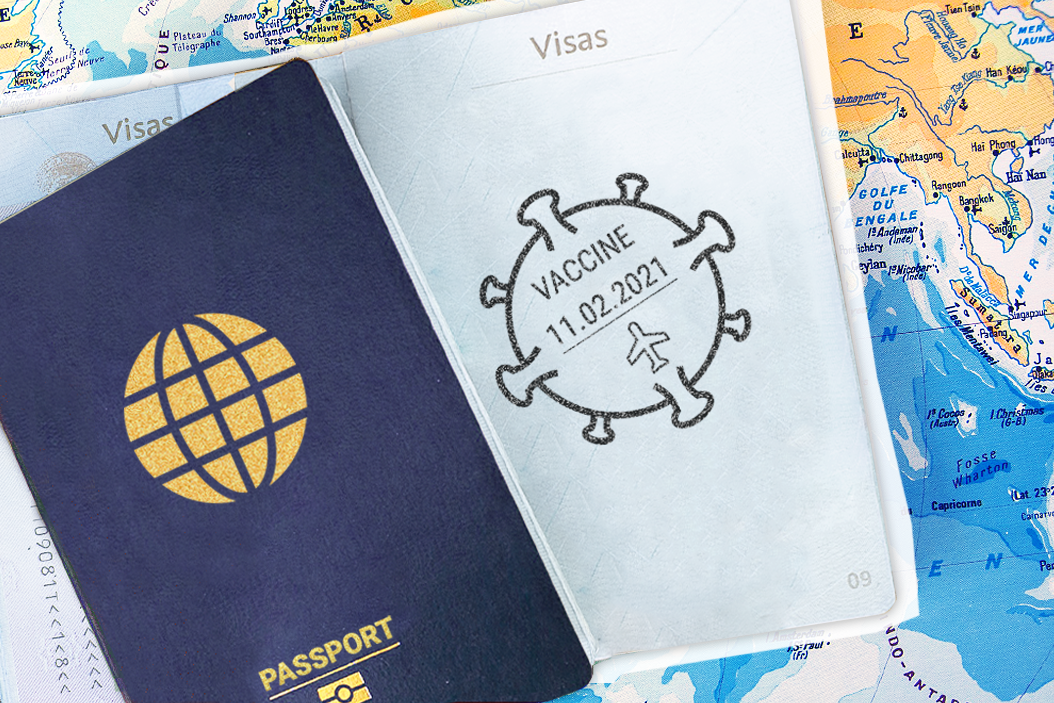February 11, 2021
"Welcome to our country," says the immigration officer, "your passport please?"
You fumble through your travel wallet, pull out your national passport, and helpfully open it to the photo page.
"Thank you," she says, "Now, the other one."
But you don't have the other one. You haven't gotten the COVID vaccine, so you don't have the "vaccine passport" that this country now requires for entry.
This scene could soon play out in many places around the world as countries and airlines begin issuing — or requiring — vaccine passports that prove the bearer has been vaccinated against COVID-19 or has recently tested negative for the virus.
This isn't just a question of that vacation you've been dreaming of since the pandemic shut down travel. Many employers could begin demanding proof of vaccination before they hire you — or even to let you in the building for an interview. Medical facilities in some places have already made clear that vaccinations for their staff will be mandatory.
Are vaccines passports a good idea? People, governments, and companies want to know who might set off a new COVID wave and who is safe. But are we moving toward a Brave New World where the holders of vaccine passports become an unfairly privileged class of people?
The arguments in favor are obvious. Governments want to know that people entering their countries are highly unlikely to spread the virus within their borders. That's particularly important for major international transit hubs like London and Hong Kong, and island tourism destinations, but also for large economies like, say, the Philippines, Thailand, Greece, or Mexico, where jobs, economic growth, and government revenue depend heavily on outside business travelers and tourists.
And national governments aren't the only ones interested in a vaccine passport. Airlines want people to feel safe enough to fly. Event producers, hoteliers, and restaurant owners — who have been hit particularly hard by the pandemic — want customers to feel secure enough to return in large numbers.
There are also strong arguments against this idea. First, it won't be easy to build such a complex system with anything approaching common standards and oversight, and the risk of mistaken identity is obvious. Given the stakes, a black market in fake passports will likely arise -- feeding corruption and undermining confidence in public gatherings, especially if some holders of vaccine passports are shown to transmit infection.
Second, even if the system works well, it will inevitably discriminate against people who, through no fault of their own, are still waiting to be vaccinated. That could mean younger and healthier people who are ineligible until later stages of the vaccine distribution process or those who are eligible but don't yet have enough information or access to vaccination sites. And those who decide not to get vaccinated because they believe it's dangerous would also pay a price in terms of mobility and employment under a system like this.
Bottom-line: The World Health Organization opposes a vaccine passport plan, but countries like Denmark, Sweden, Israel and others already have passport plans in development. Australia's Qantas Airways won't fly you down under without proof you've been jabbed. Other governments and private companies are debating right now whether and how to create and roll out such a system.
From Your Site Articles
- Hong Kong a year after the National Security Law; US-UK travel corridor - GZERO Media ›
- Make vaccine mandatory - GZERO Media ›
- Make the COVID vaccine mandatory - GZERO Media ›
- COVID vaccine mandates are coming; political instability in Tunisia - GZERO Media ›
- European travel to US still not allowed, EU asks why - GZERO Media ›
- US most unequal, least vaccinated in G7 - GZERO Media ›
More For You
Xi Jinping has spent three years gutting his own military leadership. Five of the seven members of the Central Military Commission – China's supreme military authority – have been purged since 2023, all of whom were handpicked by Xi himself back in 2022.
Most Popular
Sponsored posts
Five forces that shaped 2025
What's Good Wednesdays
What’s Good Wednesdays™, January 28, 2026
Walmart sponsored posts
Walmart’s commitment to US-made products
- YouTube
In this episode of GZERO Europe, Carl Bildt examines how an eventful week in Davos further strained transatlantic relations and reignited tensions over Greenland.
- YouTube
In this episode of "ask ian," Ian Bremmer breaks down the growing rift between the US and Canada, calling it “permanent damage” to one of the world’s closest alliances.
An employee works on the beverage production line to meet the Spring Festival market demand at Leyuan Health Technology (Huzhou) Co., Ltd. on January 27, 2026 in Huzhou, Zhejiang Province of China.
Photo by Wang Shucheng/VCG
For China, hitting its annual growth target is as much a political victory as an economic one. It is proof that Beijing can weather slowing global demand, a slumping housing sector, and mounting pressure from Washington.
© 2025 GZERO Media. All Rights Reserved | A Eurasia Group media company.
